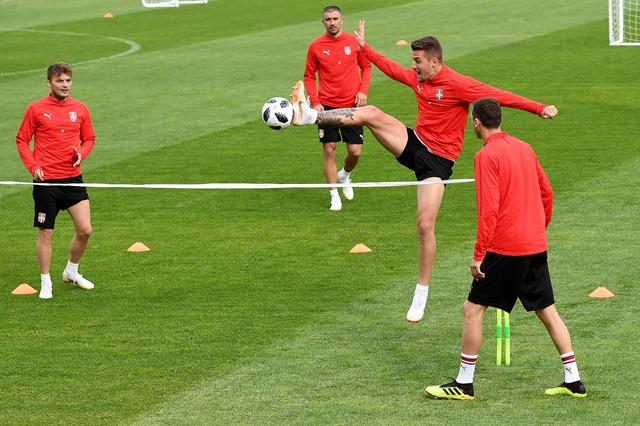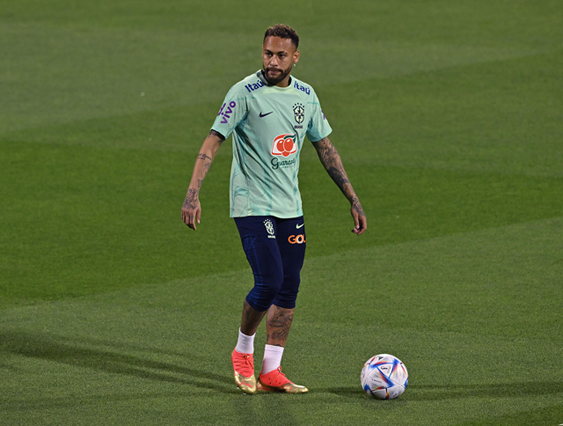You are here
Pressure on Serbia in decisive game against Brazil
By Thomson Reuters Foundation - Jun 27,2018 - Last updated at Jun 27,2018

Serbia’s midfielder Sergej Milinkovic-Savic kicks the ball with midfielder Adem Ljajic (left), defender Aleksandar Kolarov (centre) and midfielder Nemanja Matic during a training session on Sunday in Svetlogorsk for the 2018 World Cup in Russia (AFP photo by Attila Kisbenedek)
Brazil may have been one of the big disappointments so far at the Russia World Cup, but the pressure is on its opponents Serbia in the final Group E match in Moscow on Wednesday.
Brazil, whose only defeats by the Balkan side came against the old Yugoslavia in 1930 and 1934, needs just a draw to secure qualification for the last 16.
For Serbia, which will want to be masters of its own fate, a win would guarantee the progress, although a draw could see it through if Switzerland is beaten by Costa Rica by more than one goal in the other group game.
Brazil come into the game under fire at home after poor performances in their first two games.
They were subdued in their 1-1 draw against Switzerland and had to wait until injury time to finally secure the goals and the win against a limited Costa Rica side.
Full back Fagner believes the pressure is a result of their own spectacular showing leading up to the tournament, a period in which they lost only one match in 21, scoring 47 goals and conceding just five.
“I believe that because of all we did in the qualifiers and friendlies there is a huge expectation that we win our games,” Fagner told reporters at Brazil’s training camp.
“Our opponents prepare well to neutralise us, but I think as games go on we will create chances either with plays from the professor [coach Tite] or through our own improvisations. Each result and win generates more confidence.”
Brazil is expected to be unchanged from the side that beat Costa Rica, although the biggest opponent may be themselves.
The five-times World Cup winners have been criticised at home with striker Neymar bearing the brunt of the opprobrium.
The most expensive player in the world and a constant presence on billboards, television and social media, Neymar has not lived up to the hype and broke down in tears after the last-gasp win over Costa Rica.
Fagner brushed off suggestions that the pressure was already having an effect on Tite’s side and said it was a natural reaction to — and maybe even a welcome consequence of — their own high standards.
“We have created an expectation and that leads to pressure. We know we can get better, and that leaves us enthused because we know over the tournament you get better each game,” he said.
Swiss set for ‘friendly’ with soulmates
After winning a politically-charged match against Serbia, Switzerland is unlikely to face the same hostility when it faces already-eliminated Costa Rica in Group E of the World Cup on Wednesday.
Switzerland, needing a draw to reach the last 16 of the tournament, has a number of ethnic Albanians in the squad and they were given a hostile reception by Serbian fans in Friday’s dramatic 2-1 win in Kaliningrad.
Clearly fired up, goalscorers Granit Xhaka and Xherdan Shaqiri both celebrated with a gesture which appeared to imitate the eagle displayed on Albania’s flag. Both players could be suspended by world governing body FIFA before Wednesday’s match.
Serbia refuses to recognise the independence of its former province Kosovo, whose 1.8 million people are mostly ethnic Albanians. Kosovo broke away from Serbia ten years ago.
There should not be any similar problems against the Central Americans on Wednesday. Although they are more than 9,000km apart and speak different languages and have different cultures, the two small, rugged nations are considered similar in many ways, with Costa Rica often labelled as the Switzerland of Central America.
Both are renowned for political stability, neutrality and tranquillity as well as for natural beauty. The two also enjoy close diplomatic ties.
Along with Jordan, Singapore and Liechtenstein, they are part of a group at the United Nations known as the “Small Five” which, according to the Swiss foreign ministry, advocate “shared values and ideas” including an initiative to reform the UN Security Council and its working methods.
In football terms, there are also similarities, with both countries tending to punch above their weight.
Switzerland and Costa Rica are making their fifth World Cup appearances since 1990, and both got beyond the group stage in 2014.
Both have small domestic competitions with ten teams in Switzerland’s Super League and 12 in Costa Rica’s Primera Division, and both are exporters of players.
Related Articles
Brazil takes on Costa Rica on Friday needing a win to avoid equalling its worst ever World Cup run, but the focus of its concern is once aga
DOHA — Brazil heads into Monday’s World Cup last-16 tie against South Korea preoccupied by the health of the great Pele and with coach Tite
DOHA — Brazil is hoping a fully fit and firing Neymar, and a well-balanced squad around him, will allow the five-time winners to live up to

















